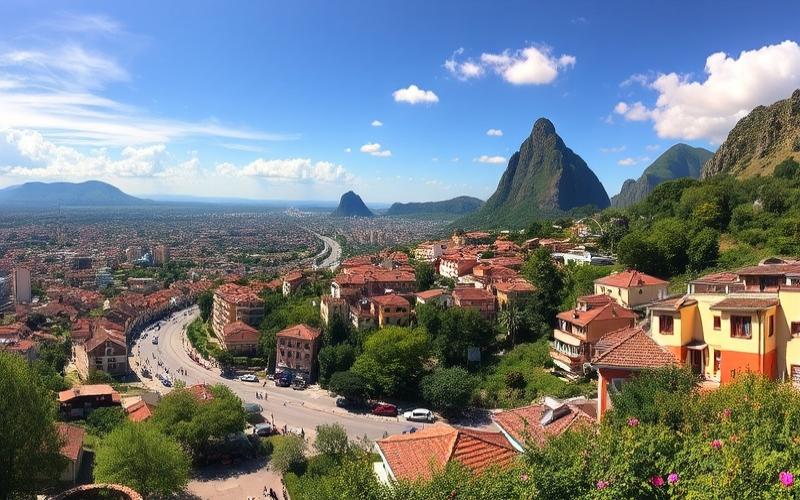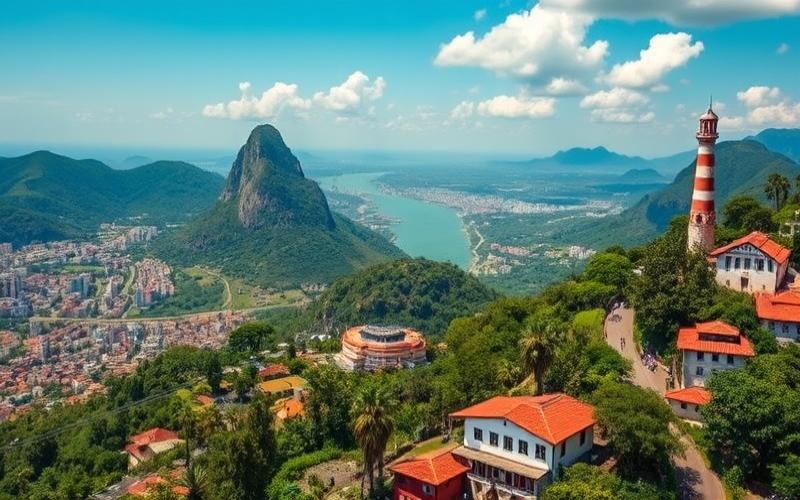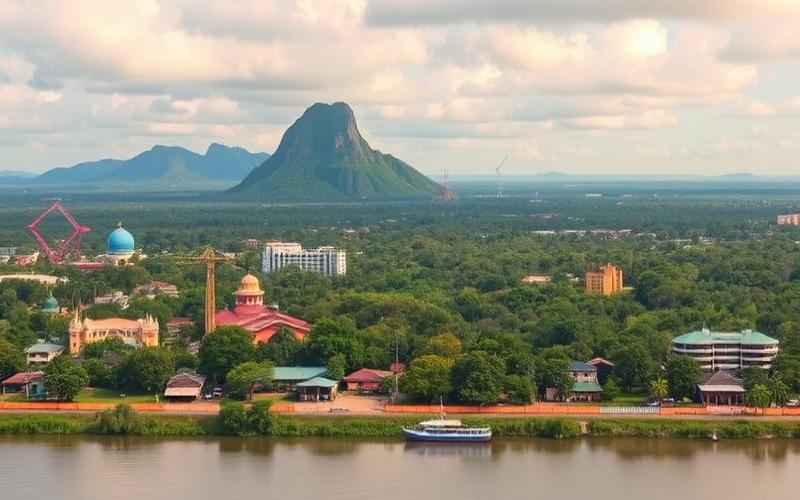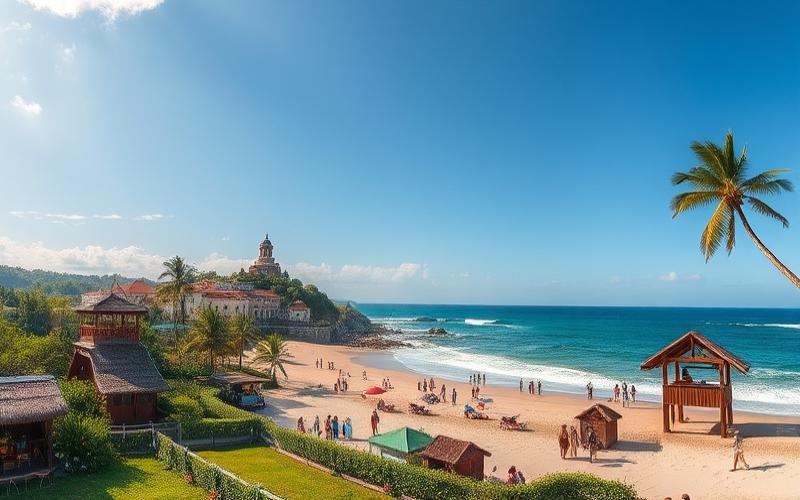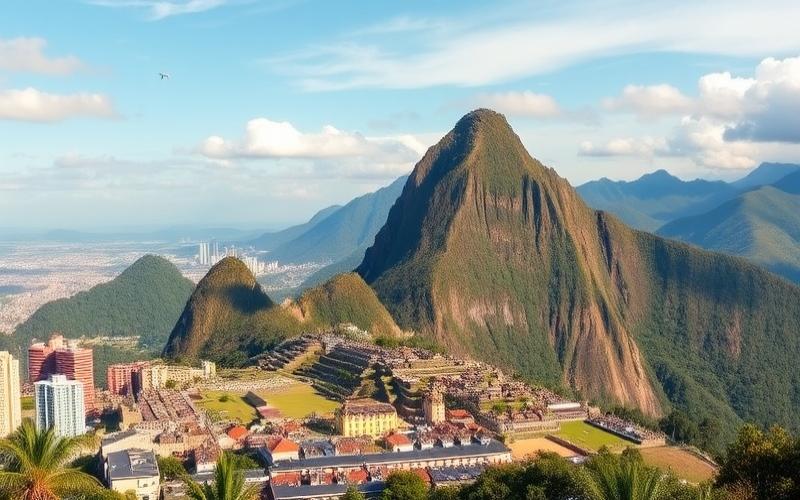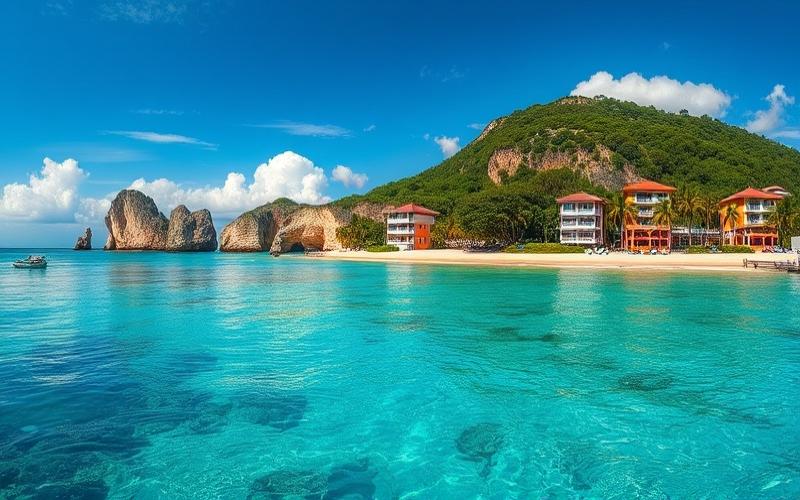
 Published on and written by Cyril Jarnias
Published on and written by Cyril Jarnias
Brazil’s Vacation Rental Market
The vacation rental market in Brazil is experiencing dynamic growth that’s attracting increasing numbers of travelers seeking authentic experiences in this fascinating country.
With its diverse landscapes, from sunny beaches to the lush Amazon rainforest, Brazil offers unforgettable stays for all tastes.
Good to Know:
Travelers are increasingly seeking accommodations that offer local immersion, away from traditional tourist complexes.
The Role of Mobile Applications
In this context, mobile applications play a crucial role in facilitating access to these temporary accommodations, becoming essential tools for both property owners and renters.
Discover the Best Applications
This article presents the 10 best applications used in Brazil to simplify your getaway planning, allowing you to easily discover the most interesting accommodation options and fully enjoy your stay.
Understanding Brazil’s Vacation Rental Market
The Brazilian vacation rental market shows strong recovery and growth trajectory, with estimated revenue of approximately $1.10 billion USD in 2022 and projected to reach $2.25 billion USD by 2030, driven by the return of tourism and the rise of digital platforms. The growth of short-term rentals is supported by the recovery of domestic and international tourism, digitalization, and property owners seeking higher returns, particularly in coastal markets and cities with high event demand.
Recent Key Points
- Embratur reported an increase in international flight bookings for the 2023 carnival (over 80,000 bookings, compared to 55,000 pre-pandemic), supporting demand for vacation rentals.
- Properties in tourist areas have seen notable appreciation, driven by platform growth and professionalization (co-hosts, concierge services).
- Globally, vacation rentals are growing steadily, driven by mobile and online booking, a trend also observable in Brazil through the expansion of international players.
Most Predominant Regions and Reasons
- Southeast: Rio de Janeiro and São Paulo — event attractiveness (carnival, business, conventions), beaches and culture; strong air connectivity.
- Northeast: Bahia (Salvador), Ceará (Fortaleza), Pernambuco (Porto de Galinhas) — stable climate, beaches, year-round tourism, value for money.
- South: Santa Catarina (Florianópolis, Balneário Camboriú) — beach destinations, surfing, attractiveness for families and regional tourism; rise of individual investors.
- Southeast/Minas Gerais and Paraná: Belo Horizonte, Curitiba — city breaks, events, stable domestic demand base; emergence of secondary markets.
Traveler Profiles
- Domestic tourists: coastal leisure travel, city breaks, family visits; price and space sensitivity, favoring entire houses and apartments.
- International tourists: increase during peak seasons (especially carnival), attracted by cultural offerings and competitive costs; book through global platforms.
- Business/event travelers: short stays around conventions and festivals, seeking well-located and flexible accommodations.
- Groups/families: preference for entire houses; the “home” segment represents the largest revenue share in the Brazilian market in 2024.
Regulations and Local Framework
Major Brazilian cities regulate short-term rentals through municipal registrations, condominium rules, and safety standards; these regulations influence supply in urban centers and high-demand coastal areas.
Hosting major events (e.g., carnival) often leads to temporary strengthening of operational and compliance requirements, affecting pricing and availability.
Impact of the COVID-19 Pandemic
- Before/after: international carnival bookings show clear post-COVID recovery, signaling the return of foreign demand and normalization of tourist flows.
- Property owner side: increased professionalization, adoption of digital tools, enhanced cleaning procedures and automation to maintain occupancy and optimize revenue.
- Customer side: increased preference for entire accommodations and flexible stays, favoring the “home” segment and mobile bookings.
Technological Evolution and Role of Mobile Applications
- Vacation rental platforms and search engines (mobile applications) expand offerings and facilitate comparison, with wide price ranges and international distribution in Brazil.
- Digitalization has favored remote management: channel managers, dynamic pricing, contactless check-in, concierge services and co-hosting, lowering entry barriers for small investors and improving occupancy rates.
- In the vacation rental market overall, growth is closely linked to mobile penetration and online booking, a trend applicable to the Brazilian context.
Summary Table of Key Dynamics
| Element | Current Situation | Implication for Vacation Rentals |
|---|---|---|
| International demand (carnival) | Flight bookings >80,000 in 2023, above pre-COVID level | Higher occupancy rates and prices during peak season |
| Dominant segment | Homes represent highest revenue share in 2024 | Preference for entire accommodations, families and groups |
| Strong regions | Rio/São Paulo, Northeast (Bahia, Ceará), Santa Catarina | Leisure/event mix, climate, connectivity |
| Professionalization | Co-hosts, concierge services, digital tools | More efficient management, higher returns |
| Distribution | International platforms and apps active in Brazil | Access to global demand, expanded offerings |
Action List for Property Owners/Investors
- Target areas with strong positive seasonality and clear event calendars (Rio, Florianópolis, Salvador).
- Optimize night/price mix through dynamic pricing and differentiated minimum stay during peak season.
- Prioritize well-equipped family “home” properties suitable for group stays.
- Ensure local regulatory compliance and condominium rules before marketing.
- Strengthen mobile distribution and automation (channel manager, digital check-in, standardized cleaning).
Good to Know:
The vacation rental market in Brazil is experiencing notable growth, with a 30% surge in recent years, largely driven by mobile apps facilitating bookings. Popular destinations include Rio de Janeiro and Bahia, attracting visitors for their beaches and carnival, while São Paulo and Florianópolis appeal for cultural events. Domestic and international tourists, seeking more flexibility and better value for money, are the main users. However, COVID-19 temporarily slowed the market, prompting strict health measures and increased interest in long-term rentals. Local regulations, varying by city, require strict compliance, often with limitations on nights. Apps like Airbnb are crucial in this dynamic, optimizing booking management and communication between owners and tenants, thus demonstrating the importance of technology in this expanding sector.
Optimizing Your Revenue with the Best Rental Management Apps
The best vacation rental management apps in Brazil increase revenue by combining three key levers: dynamic pricing, multi-platform booking management (channel manager + PMS), and automated communication with travelers, which improves occupancy rates and reduces operational costs.
Dynamic Pricing (Revenue Management)
- Automatically adjusts prices based on demand, season, events and occupancy to capture market peaks and fill low periods, increasing RevPAR and occupancy rate.
- Integrated into PMS/Channel solutions like Guesty, Hostaway, Avantio or via integrations with third-party tools; centralized configuration of rules, minimum stay, restrictions and promotions.
Multi-Platform Management (Channel Manager + PMS)
- Real-time synchronization of rates, availability and restrictions on Airbnb, Booking.com, Vrbo and other OTAs, reducing overbooking and rate discrepancies while expanding distribution.
- Centralization of bookings, payments and operations (cleaning/maintenance tasks, reporting), with API connections to major portals.
Communication and Automation
- Unified inbox and automated messaging (pre-arrival, check-in/out, instructions, upsells), which speeds up responses, improves ratings and limits disputes.
- Workflows for sending key information at the right time, reducing management time per booking.
Examples of Popular Applications and Useful Features for the Brazilian Market
Hostaway
- Strengths: management of unlimited channels, centralization of bookings, rates and tasks, automated customer messaging, coordination of operational teams.
- Revenue impact: better OTA coverage + automations = increased occupancy rate and reduced pricing errors.
- Integrations: direct connections with Airbnb, Booking.com, HomeAway/Vrbo and extended ecosystem via API.
Guesty / Guesty Lite
- Strengths: messaging automation, centralization of bookings and payments, operations for multi-listing portfolios; ideal for multi-property operators.
- Revenue impact: faster responses, service standardization and equipped pricing increase conversion and reviews.
- Integrations: major OTAs, pricing tools, direct booking sites via partners.
Tokeet
Positioned as PMS/channel for short-term with similar automations (messaging, calendar, rates), often used by hosts and small agencies; comparable alternatives mentioned: Uplisting, Lodgify.
Avantio
- Strengths: “all-in-one” solution PMS + channel manager + website, pricing and multi-OTA distribution international and local portals; aims for portfolio growth.
- Conditions: targeted at managers with at least 20 properties; integrations 50–60+ connections depending on modules.
- Revenue impact: distribution diversification and integrated tools to increase revenue and retain travelers.
Smoobu (Complementary Reference)
- Strengths: unified inbox, automated messaging, multi-OTA booking synchronization, mobile management.
- Operational impact: time savings on communication and calendar updates, limiting errors and no-shows.
Effects on Occupancy and Operational Costs
- Occupancy: dynamic pricing + multi-OTA exposure increases visibility and aligns prices with local demand, which tends to raise occupancy rate and margin per available night.
- Costs: automation (messaging, tasks, cleaning scheduling) and centralization of flows reduce administrative time per booking and costs related to duplicates or overbooking.
- Service quality: shorter response SLAs via unified messaging improve ratings, favoring OTA ranking and future conversion.
Comparative Summary Table (Key Features)
| Solution | Dynamic Pricing | Multi-OTA Channel Manager | Unified/Automated Messaging | Operations (Tasks/Cleaning) | Integrations/Ecosystem | Targeting |
|---|---|---|---|---|---|---|
| Hostaway | Via integrations/rules | Yes, unlimited | Yes | Yes | Airbnb, Booking, Vrbo, API | Multi-property, agencies |
| Guesty | Yes (integrations) | Yes | Yes | Yes | Major OTAs + apps | Multi-listing portfolios |
| Tokeet | Yes (depending on modules) | Yes | Yes | Yes | OTAs + third-party tools | Hosts/SMB agencies |
| Avantio | Yes (integrated) | Yes, 50–60+ connections | Yes | Yes | Global OTAs + local portals | 20+ properties, agencies |
| Smoobu | Rules/integrations | Yes | Yes | Basic | Major OTAs | Hosts/SMB |
Ease of Use and Ecosystem Integration
- Learning curve
- Guesty/Hostaway: comprehensive interfaces, feature-rich; initial setup more demanding but robust for multi-property.
- Smoobu/Lodgify: more accessible for small structures, quick deployment and user-friendly mobile app.
- Avantio: powerful but intended for established structures; guided onboarding with dedicated team.
- Industry integrations
- Direct API connections to OTAs (Airbnb, Booking, Vrbo) for real-time synchronization; partner modules or apps for payments, connected locks, insurance, accounting and dynamic pricing.
- Subscription costs
- Frequent models: monthly subscription per property or tiers by volume, sometimes commissions on bookings; “pro” solutions (Guesty, Hostaway, Avantio) tend to be more expensive but offer return through increased occupancy and productivity gains.
- Free trials or onboarding support depending on provider; some platforms require minimum properties (e.g., 20+ for Avantio).
Best Practices to Maximize Revenue in Brazil with These Apps
- Implement dynamic pricing rules by city and local seasonality (festivals, holidays), with occupancy thresholds triggering price increases/decreases.
- Diversify distribution via channel manager and activate differentiated rates by channel while maintaining parity control and restrictions by market.
- Automate messaging (pre-check-in in Portuguese, access instructions, upsells: airport transfers, additional cleaning) to improve reviews and generate additional revenue.
- Standardize operations (cleaning checklists, maintenance scheduling) to reduce costs and avoid last-minute cancellations.
Good to Know:
Rental management applications like Hostaway, Guesty, and Tokeet enable Brazilian property owners to optimize their revenue through advanced features such as dynamic pricing, capable of adjusting prices based on demand, and multi-platform booking management tools that centralize information from sites like Airbnb and Booking.com. These applications also facilitate communication with tenants through integrated messaging, reducing response times and improving traveler experience. By increasing occupancy rates and reducing operational costs, their effective use can transform a rental property into a more stable and predictable income source. Easy to use and well-integrated with other popular platforms, they offer various subscription options to suit different budgets while providing an intuitive user interface, making adoption accessible even for beginners.
App Analysis: Airbnb and Its Competitors in Brazil
Airbnb remains the most visible player in Brazil’s vacation rental market, but faces strong and segmented competition: Booking.com captures a large share of urban and hotel demand, Vrbo is repositioning toward urban offerings while maintaining its “entire homes” DNA, and QuintoAndar dominates mainly local residential medium/long-term rentals with growing presence in short-term furnished rentals in some cities.
- Booking Holdings (Booking.com) leads globally in short-term rentals with about 48% of bookings from managers’ side, driven by its hotel + rental inventory depth and strength in cities.
- Airbnb represents about 40% of the mix for operators, with advantage on leisure stays and unique accommodations; its visibility is increasingly driven by the “Guest Favorites” badge.
- Vrbo (Expedia Group) grows more moderately than its rivals in 2025 and moves toward short stays in urban areas and multi-unit inventory; growth is no longer driven by large family villas as before.
- QuintoAndar is highly popular for apartment searches in Brazil, especially for locals; it’s frequently cited as reference channel in Rio and São Paulo for finding “good deals” in residential rentals, including furnished, with language barrier for non-Portuguese speakers.
Comparative Table of Key Features
| Platform | Positioning in Brazil | Dominant Accommodation Types | Booking and Pricing | Programs and Differentiators | Security/Insurance |
|---|---|---|---|---|---|
| Airbnb | Strong leisure/urban awareness; visibility boosted by Guest Favorites badge | Wide range (rooms, entire homes, unique) | Flexible options, monthly payments for long stays; emphasis on ratings for ranking | Guest Favorites, co-host ecosystem; optimization via review quality | Host guarantee and liability protection including active dispute mediation |
| Booking.com | Leadership in urban demand; mixed hotel + rental inventory | Hotels, B&Bs, private rentals | “Smart” filters and natural language search; AI tools (real-time Q&A, review summaries) | Genius program (levels, discounts and perks); flight, car, cruise integration | Existing dispute process but resolution perceived as slower by users |
| Vrbo | Transition toward more urban and short stays; Expedia ecosystem | Traditional entire homes + massive urban addition | More direct/simple booking process; sometimes higher prices | One Key (cashback/rewards); “family home” marketing focus | More “hands-off” resolution; host insurance via third-party options |
| QuintoAndar | Local reference for apartments; strong adoption by residents | Long/medium-term apartments; urban furnished | Native local experience in Portuguese; digital rental journey | Focus on Brazilian residential market; competitive local deals | Policies centered on local residential rental; language barrier for foreigners |
Detailed Comparison of Pricing and Booking Systems
- Airbnb
- Flexible pricing with weekly/monthly discounts; visibility strongly correlated with reviews and Guest Favorites badge which now surpasses Superhost status for ranking.
- Integrated and proactive mediation process for disputes, reassuring many hosts and travelers.
- Booking.com
- Wide range of rate conditions (non-refundable to flexible) inherited from hotel industry; new “smart” filters and natural language search that improve offer-demand matching and conversion.
- Genius program offering progressive discounts and benefits to stimulate loyalty; multi-product coverage (flights, cars) that captures travelers planning complete trips.
- Vrbo
- Pricing often perceived as higher; simple booking process and focus on entire homes; more “hands-off” conflict resolution approach between host and traveler.
- Evolution toward shorter stays and multi-unit inventory in urban areas, impacting visibility of traditional villas.
- QuintoAndar
- Pricing and deposits adapted to local rental market; very competitive for urban apartments, but interface mostly in Portuguese; widely used by “Cariocas” in Rio to find apartments.
User Experience
Airbnb: accommodation diversity and inspiration-focused interface; new emphasis on experience quality via “Guest Favorites”; co-host network that facilitates multi-listing operation for small operators.
Booking.com: robust search engine, AI (real-time Q&A, review summaries) and smart filters; end-to-end travel integration appreciated by price and convenience-oriented users.
Vrbo: direct and clear booking journey, more oriented toward “families/entire homes”; One Key program for rewards, but support and cancellation policies considered less clear by some.
QuintoAndar: local UX very adapted to residents, efficient discovery of urban apartments; strong adoption in Rio/São Paulo for good deals, but language obstacle for foreigners.
Security and Insurance Policies
Airbnb: combines Host Guarantee and Liability Protection, plus resolution center with active mediation during disputes.
Vrbo: favors direct host-traveler resolution; offers host insurance via third-party partners rather than native coverage equivalent to Airbnb.
Booking.com: dispute mechanisms and support, but user feedback about sometimes lengthy resolution times; security often delegated to policies of listed properties/hotels.
QuintoAndar: oriented toward Brazilian residential legal framework; policies adapted to local rental lease rather than international “vacation stay” model.
Airbnb’s Regional Strategies in Brazil
- Product adaptation and visibility: focus on experience quality (high ratings → Guest Favorites badge) to maximize discovery in highly competitive Brazilian metropolises.
- Operations and offerings: co-host ecosystem enabling small Brazilian operators to industrialize hospitality and maintenance, relevant in large cities.
- Competitive context: on the coast and in capitals (Rio, SP), Airbnb faces Booking.com for urban demand and QuintoAndar on furnished apartments; on beach/family homes, pressure comes from Vrbo, even as it pivots toward urban.
- Local sensitivities: perception of price/fees may push some travelers toward Vrbo in Rio, mentioned by local guides, prompting Airbnb to work on fee transparency and pricing competitiveness.
Quick Comparative List
- Popularity/market share: Booking.com leading globally, Airbnb solid #2, Vrbo more modest but transitioning; QuintoAndar very strong in local residential.
- Usage types: Airbnb = leisure/unique + urban; Booking.com = urban/hotel + rental; Vrbo = entire homes/families (with urban shift); QuintoAndar = local apartments.
- Pricing: Airbnb flexible and driven by reviews; Booking.com optimized by filters/AI and Genius loyalty; Vrbo often more expensive but simple; QuintoAndar competitive locally.
- Security: Airbnb strong coverage and mediation; Vrbo third-party options and hands-off approach; Booking.com support but possible delays; QuintoAndar oriented toward local lease.
Assessment of Airbnb’s Strengths and Weaknesses in Brazil
Strengths
- Very wide inventory and accommodation diversity, plus strong visibility via “Guest Favorites”.
- Robust mediation/insurance reassuring hosts and travelers.
- Ability to industrialize hospitality via co-hosts to adapt to large Brazilian cities.
Weaknesses
- Competitive pressure in urban areas by Booking.com (AI search, Genius) impacting conversion.
- Sensitivity about fees/pricing in certain Brazilian destinations, where local travelers recommend alternatives.
- On “family entire homes” segment, specific competition from Vrbo, which intensifies urban offerings and may capture part of city-break demand.
Good to Know:
Airbnb stands out in the Brazilian market through localized initiatives, such as adopting flexible policies adapting to local preferences, but faces fierce competition from Booking.com, which dominates in popularity due to its wide range of accommodation options. Vrbo attracts Brazilian families by emphasizing entire vacation homes, while QuintoAndar specifically targets long-term rentals with strong urban appeal. Although Airbnb has recently aligned with competitive pricing and strengthened security measures, Booking.com often offers no-cancellation-fee options, a major advantage for hesitant travelers. Recent improvements to Airbnb’s user experience, such as personalized recommendations, reflect a loyalty strategy, but persistent issues related to host insurance policy could hinder competition. Statistics show Airbnb’s market share remains significant at 30%, but Booking.com leads with 40%, suggesting that increased attention to specific Brazilian customer expectations could consolidate and improve its position.
Disclaimer: The information provided on this website is for informational purposes only and does not constitute financial, legal, or professional advice. We encourage you to consult qualified experts before making any investment, real estate, or expatriation decisions. Although we strive to maintain up-to-date and accurate information, we do not guarantee the completeness, accuracy, or timeliness of the proposed content. As investment and expatriation involve risks, we disclaim any liability for potential losses or damages arising from the use of this site. Your use of this site confirms your acceptance of these terms and your understanding of the associated risks.


